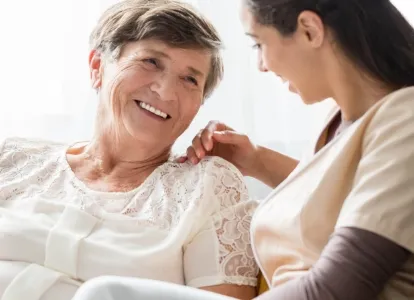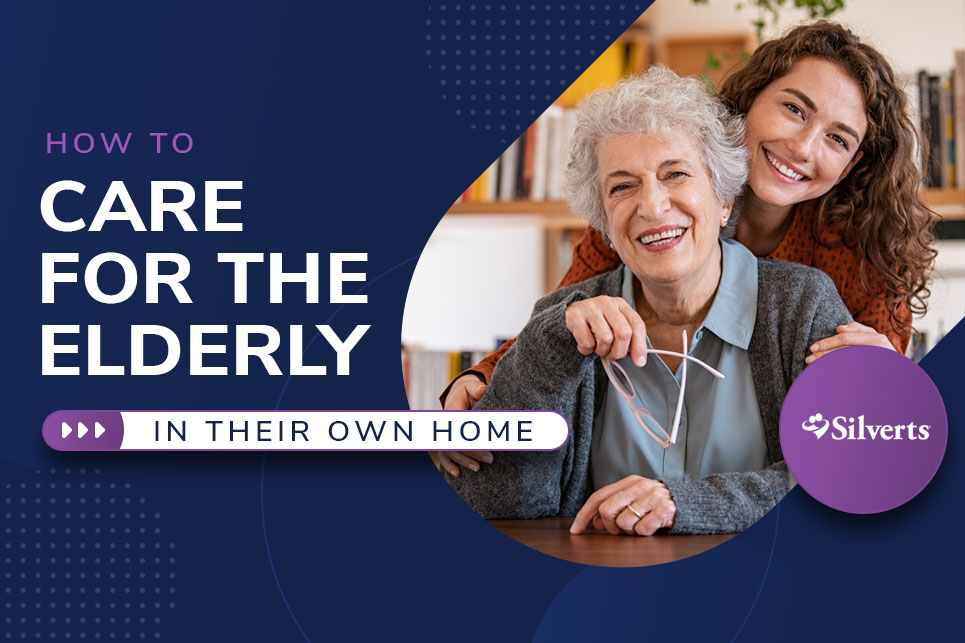How to Care for the Elderly in Their Own Home
Many elderly people hope to age in place as they grow older instead of moving to an assisted living facility. While staying at home can be less stressful — not to mention more affordable than a nursing home — learning how to care for elderly in-home patients presents a high learning curve for caregivers. To help you formulate a care plan, we’ve rounded up 18 tips to help family members and other potential caregivers put together a care plan for elderly people living at home. From hiring a cleaning service to getting clothing for the disabled, here are some things to consider:
Check-in regularly about their health
If you see your parents regularly, then you might not notice the gradual, incremental signs of decline. However, if your visits with them are less frequent, then you might not be around often enough to observe signs of their declining health. Check-in on them as often as you can and get siblings or other family members to do so as well so that you can compare notes. Look for visual signs in the home, such as expired foods or signs of damage to the car. You should also ask your elderly loved ones specific questions about how they are coping with everyday tasks, such as cooking and driving, and pay attention to their answers.
Consult with their doctor
In addition to making your observations, you should stay in close consultation with their primary care provider, as well as any other health specialists they are seeing. Their doctor may have insights that you don’t, such as information about the potential side effects of their medications. You can also bring behavioral signs of decline to the doctor’s attention, which can help elderly loved ones get screened for an official diagnosis. Their doctor may also be able to help guide the level of care needed. You will need to establish yourself as your loved one’s health care proxy or medical power of attorney in order to discuss medical conditions, along with having your aging relative sign a HIPAA form.

Give them adaptive clothing
Adaptive clothing is specifically designed with the mobility needs of elderly people in mind. Adaptive clothing allows some elderly people to keep dressing themselves even after they can no longer work the closures on traditional clothing. If your loved one has dementia and is prone to disrobing at inappropriate times, anti-strip clothing or stay-dressed clothing can help them stay clothed. These aging loved ones should also wear shoes with anti-skid soles at all times, even inside the house, to reduce their risk of trips and falls.
Get the entire family involved
Caring for elderly loved ones is more than a full-time job. Having more caregivers means it will be easier to share the burden. Family members can help with not just traditional caregiver activities, but also other responsibilities like grocery shopping and laundry. Even if some family members can only provide respite care when you need a break, instead of helping out every day or week, it will be a significant help for the main caregivers.
Switch errands to delivery when possible
One thing that you do to help care for the elderly in their own home is to switch as many errands as possible to delivery. This is an especially big help for elderly parents who are mostly able to take care of themselves at home but can no longer drive due to vision impairments or other health issues. It will also help to ease the burden on caregivers who don’t have the time or energy to run out of groceries or toilet paper. By having other people bring over household essentials, these elderly loved ones can free up their time to focus on other important tasks.
Outsource their meal prep
Many seniors are at risk of malnutrition, which means that preparing nutritious meals is of paramount importance. Unfortunately, most seniors don’t have the energy to cook involved meals for themselves, and they may have dietary restrictions that make cooking even more complicated. Using stoves and knives can also pose a hazard to seniors who struggle with coordination or don’t remember to turn off appliances. Using a meal delivery service, such as Meals on Wheels, will ensure that they are getting the nutrition that they need without having to work in the kitchen too much.

Consider a cleaning or lawn care service
Major household chores like taking care of the lawn, doing laundry or cleaning the house may become too burdensome for seniors. Hiring an outside service to take care of these major chores can help your loved ones age in place for longer and also take some of the responsibility off of their caregivers. Ask friends and family who live in the area for recommendations of trusted services they have used in the past. Consider scheduling an initial appointment to test out the quality of their work before committing to an ongoing agreement.
Hire a home health aide
Skilled nursing care is expensive, but home health aides are more affordable. While not qualified to help with medical tasks, home health aides can assist with everyday tasks such as bathing, dressing and eating. They may also provide much-needed socialization for elderly people who struggle to leave the house. These workers can be hired either part-time or full-time, depending on your budget and your elderly loved one’s needs. While not a replacement for skilled nursing care, these aides can be an excellent support piece to the overall care plan that helps your loved ones age in place.
Explore adult day programs
Adult day programs provide coordinated care for the elderly during the day to help them maintain independence or as long as possible. These programs may be run by state or local governments, or they may be a private program. This is a great solution for caregivers who work during the day and can’t be home to check on their elderly loved ones. If the programs are run by the state, they may be confined to low-income or no-income adults, so check the programs in your area to see if you qualify.
Discover Our Snap On Clothing Selection
Connect with local service programs
Many areas have service programs that are specifically designed to assist aging seniors. For instance, some high schools and churches have volunteer programs that pair up students with older adults in need of companionship and to help with simple errands. Some local governments also have senior-to-senior programs that pair up senior volunteers with other elderly people who will benefit from companion care. These programs are not a substitute for full-time caregiving, but they can be a nice help and an important social boost.

Create a care plan
Once you have decided on the various forms of assistance that your elderly loved ones need to implement so they can continue living at home, it’s time to create a care plan. Start by creating a list of all the daily, weekly and monthly tasks that need to happen, and then assign them to each person. You should include activities of daily living that are directly related to their care, such as preparing meals and taking medication. You should also include other tasks, such as grocery shopping or cleaning the house so that you get a complete picture of their care.
Do a home safety audit
The home environment can pose many hazards to the elderly. If they are trying to age in place, it’s essential to perform a home safety audit. Look out for trip and fall hazards such as loose electrical cords, rugs and clutter on the ground. Also search for things that can pose danger to people with dementia, such as kitchen appliances that don’t automatically turn off. What’s hazardous will depend on your loved one’s level of mobility and cognitive function, so take their unique limitations into account when assessing their home.
Senior-proof their home
Once you have finished your home safety audit, it’s time to make some changes to their house to make it a safe environment to live in. Some common fixes include installing grab bars and non-slip mats in the shower, turning down the water heater to prevent scalding and installing nightlights to illuminate walkways in the dark. Other fixes, such as a stairlift, require more of an investment of time, money and labor. For those fixes, you’ll need to do a cost-benefit analysis to determine if it’s worth it to update the house or if your loved one would be better served by moving to a new location.
Encourage regular exercise
Exercise supports mental and physical health in people of all ages, including seniors. Even if your loved one is wheelchair-bound, they can still do chair exercises for seniors. Low-impact exercises such as walking the neighborhood or pedaling on a stationary bike will also be beneficial if their joints can’t handle more jarring activity. Talk with their doctor about what type and level of physical activity is most appropriate for their health needs and limitations.
Experiment with mobility aids
Mobility aids such as wheelchairs, canes and walkers can help the elderly get around their homes and also navigate the world outside. It can also significantly resist the risk of tripping and falling. Some elderly people are resistant to the idea of using mobility aids, so you might need to start them off with a cane or a walker and then slowly work up to the idea of a wheelchair. You can also enlist their doctor to help discuss the benefits of using a mobility aid if they are resistant to using these aids.

Help them stay social
Maintaining social connections is incredibly important for the elderly, and it can help stave off depression and anxiety. Some of the other ideas on this list, such as the mentioned volunteer programs, are specifically designed to help seniors forge social connections. When taking care of the elderly at home, don’t forget to help meet these social needs in addition to taking care of basic daily activities. For instance, maybe you can have one of their friends over for lunch or offer to drive them to a social engagement to help them leave the house.
Automate their bill payments
Many older people forget to pay their bills on time and remembering to pay bills puts an extra mental burden on caregivers, as well. To make things easier on everyone, try scheduling as many automatic payments as you can. That way you never have to worry about logging in or missing a payment deadline. Some services, such as cell phone carriers and internet providers, even offer a discount for scheduling automatic payments, so you might be able to save a little money too.
Investigate your financial options
Taking care of an elderly loved one can present financial strain, but there are options to explore. For instance, several different tax breaks might apply to your situation, including the Child and Dependent Care Credit. If your loved one owns the home they are currently living in, you might be able to use a reverse mortgage to get money to fund their care. If they have a life insurance policy, you might be able to cash it out for a certain percentage of the policy’s face value, depending on the terms of the policy.
For more resources about caring for elderly loved ones, check out the Silverts Giving Care blog, which includes guides on everything from managing arthritis flare-ups to caring for someone with dementia. If you are looking for adaptive clothing for the elderly, shop our extensive selection of garments for both men and women at the Silverts online store. All orders ship for free within the continental U.S. and come with a 60-day return and exchange policy.
Image Credits
envastudio/Shutterstock.com
Pranch/Shutterstock.com
Yuri A/Shutterstock.com
Ground Picture/Shutterstock.com
SeventyFour/Shutterstock.com





No Comments